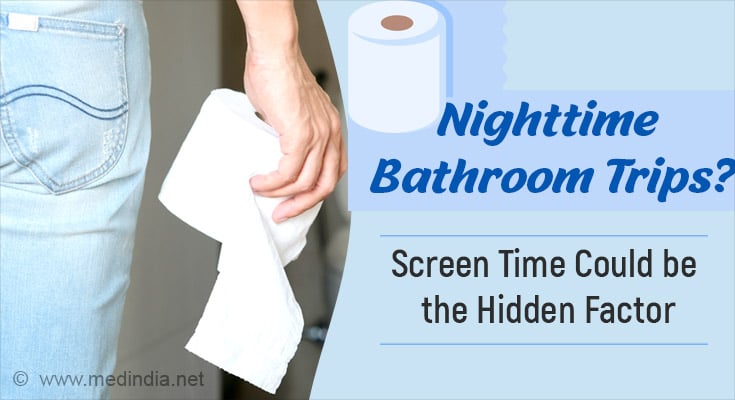-
Over 5 hours of daily screen time poses a 48% higher risk of nocturia - Sedentary habits and increased beverage intake contribute to frequent nighttime urination
- Public awareness and lifestyle changes are crucial for managing screen time, preserving sleep, and overall well-being
With this fast-paced and digitally driven society, the act of unwinding after a long day often involves settling down in front of the television to indulge in the latest binge-worthy series. This modern ritual is not only a form of entertainment but also a means of escapism for many individuals.
However, recent research has shed light on potential unintended consequences associated with this seemingly innocuous habit, revealing a concerning correlation between prolonged TV or video viewing and an increase in nocturia occurrences among adults in the United States.
Advertisement
Correlation Between Screen Time and Nocturia
Nocturia, defined as the need to urinate multiple times during the night, has been linked to extended periods of TV and/or video viewing, according to a study published in the journal Neurourology and Urodynamics (1✔ ✔Trusted Source
Association between TV and/or video time and nocturia in adults: An analysis of the National Health and Nutrition Examination Survey
).
The study, which examined data from the National Health and Nutrition Examination Survey spanning 2011 to 2016, involved 13,294 U.S. individuals aged 20 and older. Of these, 31.86% reported experiencing nocturia, while 68.14% did not.
The study’s primary focus was to investigate the correlation between the time spent watching TV and/or videos and the occurrence of nocturia. Participants who reported 5 or more hours of daily TV and/or video viewing had a staggering 48% higher risk of experiencing nocturia compared to those with less than 1 hour of daily viewing time.
Did You Know?
Did you know? Excessive screen time can lead to problems in social-emotional development, including obesity, sleep disturbances, depression, and anxiety.
Multivariable logistic regression models were employed to explore the impact of TV and/or video viewing time on nocturia, revealing a significant association between prolonged screen time and nocturia risk.
Advertisement
Health Implications of Digital Cosumption
The research delved into potential explanations for this connection, highlighting risks such as type 2 diabetes associated with sedentary behavior during TV viewing. A sedentary lifestyle contributes to fluid retention and increased beverage consumption during viewing sessions, both of which can worsen nocturia.
Furthermore, the study underscored concerns about potential neurological disorders and the negative impact of prolonged screen exposure on sleep quality, compounding the risk of nocturia.
Despite the compelling findings, the study acknowledges certain limitations, such as reliance on self-reported data and the inability to definitively establish cause and effect. Nevertheless, it serves as a crucial reminder of the intricate ways in which daily habits, particularly screen time-related activities, can influence health in unexpected manners.
Advertisement
Balancing Digital Engagement for Better Sleep
The implications for public health and personal well-being are significant. The association between excessive screen time and nocturia calls for a broader awareness of the potential health risks posed by digital consumption habits.
Healthcare professionals are encouraged to discuss these findings with their patients, advocating for mindful screen time management as part of a holistic approach to health and well-being.
Individuals experiencing nocturia are advised to consider lifestyle adjustments, including reducing screen time before bedtime, as a possible mitigative strategy. It is crucial to balance digital engagement and better sleep in our increasingly digital world. While technology enriches our lives, fostering a healthier relationship with screens is crucial for safeguarding well-being and ensuring that nightly rituals do not compromise a good night’s sleep.
In summary, extended TV and/or video time have implications on patterns of nocturia. Healthcare professionals and public health practitioners play a crucial role in offering behavioral intervention recommendations and encouraging appropriate screen time management for improved overall health.
Reference:
- Association between TV and/or video time and nocturia in adults: An analysis of the National Health and Nutrition Examination Survey – (https://onlinelibrary.wiley.com/doi/10.1002/nau.25406)
Source-Medindia



